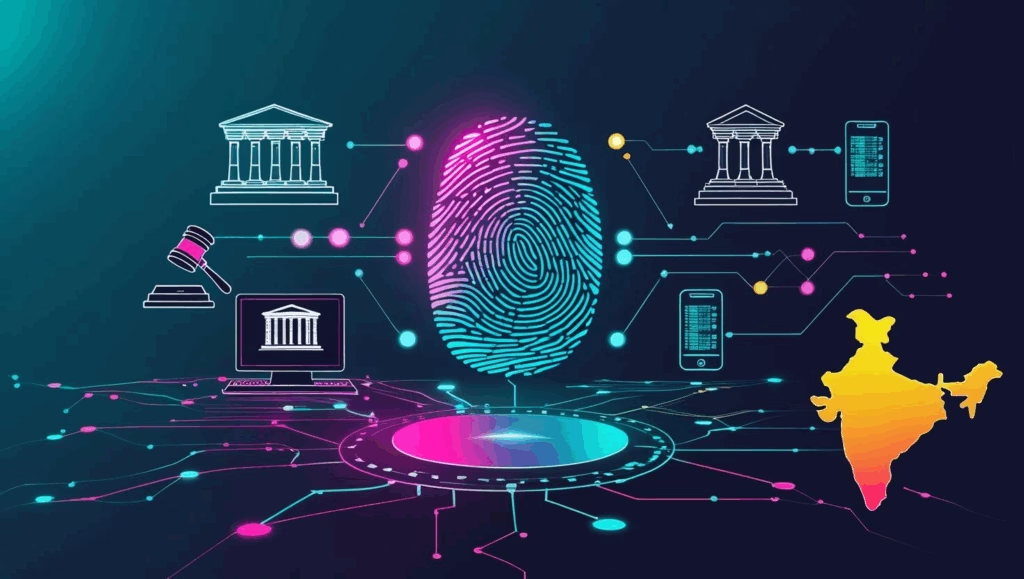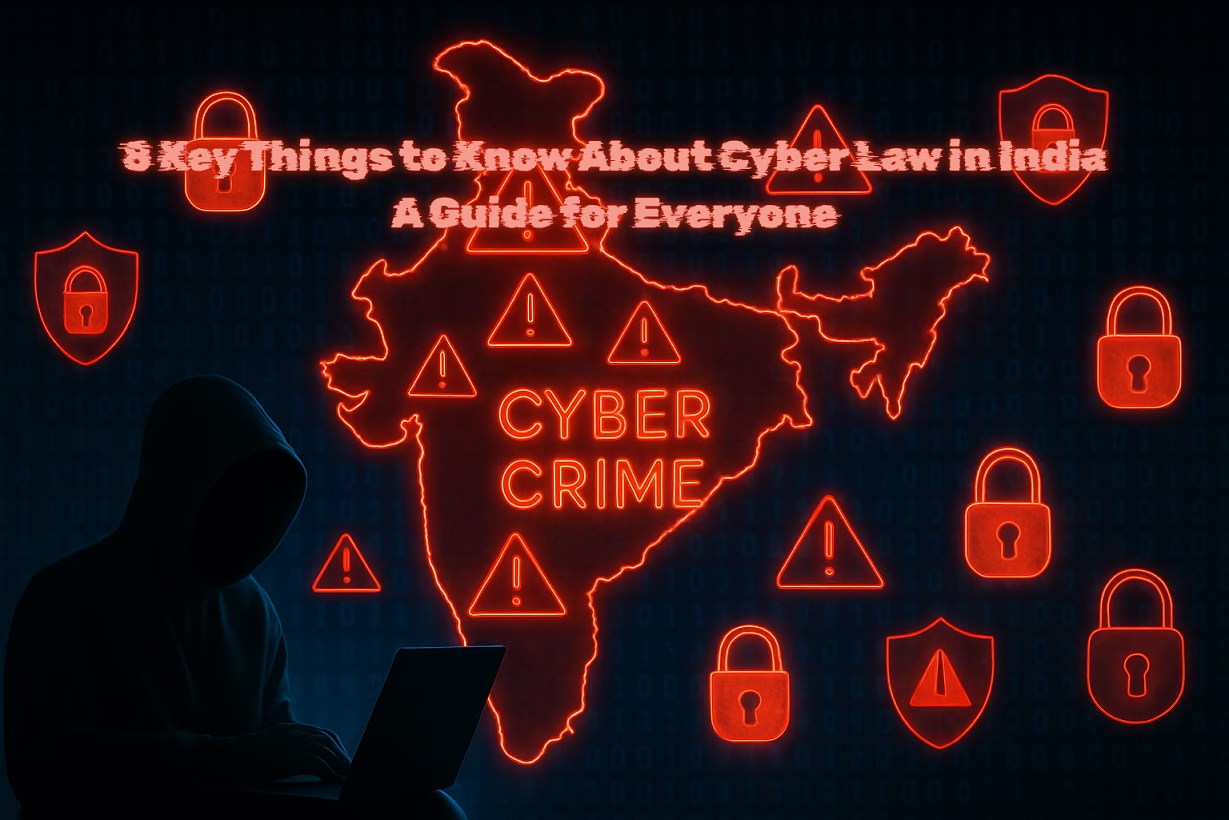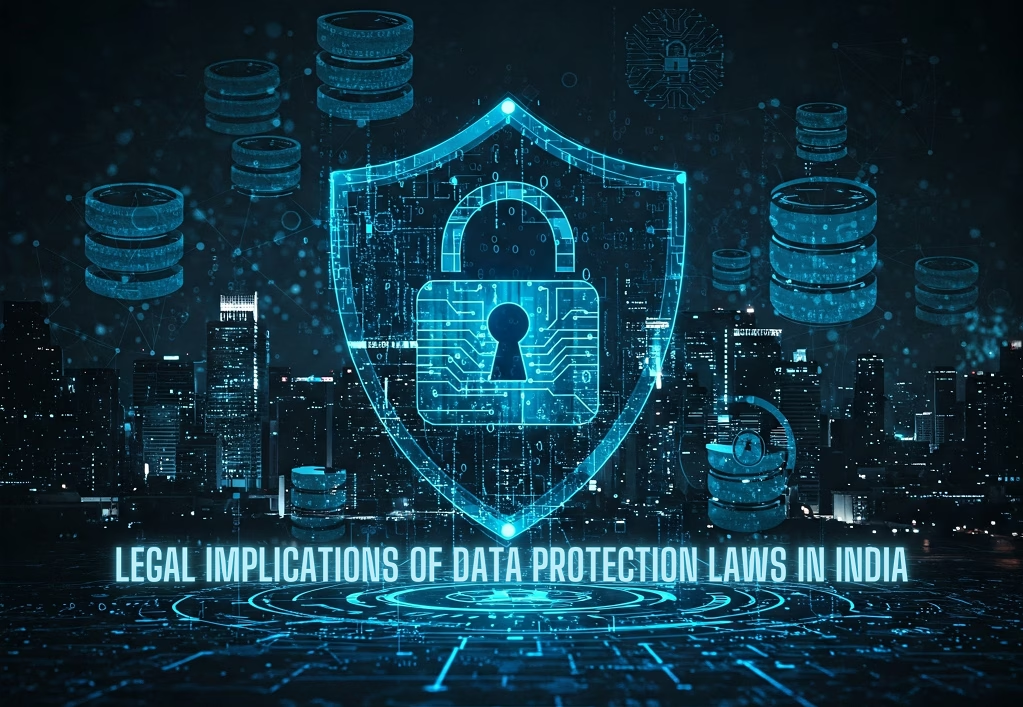Introduction:
We are living in a digital era, where most of our daily activities take place online, whether ordering food, transferring money, watching movies, or talking to friends. This digital life has brought numerous benefits to our lives, but it also introduces a new type of risk: cybercrime.
The number of cybercrimes like hacking, identity theft, and online fraud is increasing day by day. Cyber law in India plays a crucial role in safeguarding individuals and organizations.
Cyber law acts as a traffic rule book for internet users. It tells us what is legal and what is illegal online, who is responsible for wrongdoing, and how victims can get justice. The main objective of cyber law in India is to make the digital world a safer place for everyone.
In this blog, we will discuss in detail what cyber law is, its importance, and how cyber law can protect you in the digital realm.
Table of Contents
1. What is Cyber Law?
Cyber law is a branch of law that deals with legal issues related to digital technology, the internet, and virtual communication. It encompasses everything from the use of social media and email to online banking, data protection, and e-commerce.
In simple terms, cyber law is a set of rules governing your activities in the digital world. Just as traffic laws keep the roads safe, cyber law in India helps keep the internet safe for Indian citizens, businesses, and the government.
This area of law is important because today, most of our personal and financial information is stored online. Without proper and strict laws, it is not possible to prevent crimes like hacking, data theft, identity theft, and online harassment, and to punish the perpetrators.
In India, cyber law is primarily regulated by the Information Technology (IT) Act, 2000. It recognizes legal transactions and defines cybercrimes, along with the associated penalties.
2. The Foundation: Information Technology Act, 2000
The foundation of cyber law in India is the IT Act, 2000, which provides legal recognition to electronic communications, data protection, and online transactions and protects internet users from cybercrime. In this digital world, this Act plays a vital role in securing our online presence.
Objectives of Enacting the IT Act, 2000:
Before 2000, there was no law in India to protect internet activities. There was no law to regulate online contracts, electronic signatures, or criminal acts committed in cyberspace. However, with the rise in internet usage, the number of crimes, including hacking, identity theft, and misuse of digital platforms, has also increased. To combat these crimes, the central government enacted the IT Act, 2000.
The main objectives of the Act are:
- To control cybercrime and punish the culprits of crimes like hacking, identity theft, data theft, and cyberstalking.
- To provide legal validity to electronic records and digital signatures.
- To establish an authority for cyber regulation and digital certification.
- To promote secure electronic communication and e-commerce.
Scope of the IT Act, 2000:
Section 1(2) and Section 75 of the IT Act make the Act applicable to the whole of India and also to any offence or violation committed by any person outside India, if the act or conduct involves any computer, computer system, or computer network situated in India. This grants the Act extraterritorial jurisdiction, which is particularly important in the digital world.
Key areas covered under the IT Act include:
- Legal recognition of Electronic Records (Section 4) and Electronic Signatures (Section 5)
- E-Governance (Section 6-10A)
- Regulation of Certifying Authorities (Section 17-34)
- Cybercrimes and Penalties:
- Section 43: Provides penalty and compensation for damage to the computers, computer systems, and data
- Section 65: Covers tampering with computer source documents
- Section 66: Provides punishment for computer-related offences
- Section 66C: Provides punishment for identity theft
- Section 66E: Provides punishment for violation of privacy
- Section 66F: Punishes cyber terrorism
- Section 67: Pertains to the publication and transmission of obscene material in electronic form
- A framework for intermediaries (like social media platforms) and their liabilities (Section 79)
3. Cyber Law and Children:
Nowadays, especially in the wake of the COVID-19 pandemic, children and adolescents are spending more time online than ever before, using the internet to attend classes, play games, watch videos, and use social media. While the internet provides education and entertainment, it also exposes them to the risks of online grooming, cyberbullying, and other harmful content, as well as data theft.
The Information Technology Act, 2000, as amended in 2008, inserted Section 67B which specifically criminalizes the publication or transmission of material depicting children in sexually explicit activities, and includes imprisonment for up to 5 years and a fine of up to 10 lakh rupees for the first offence, and imprisonment for up to 7 years and a fine of up to 10 lakh rupees for the second or subsequent offence.
The Protection of Children from Sexual Offences (POCSO) Act, 2012, along with the IT Act, creates a strong framework to combat online sexual abuse of children.
The newly enacted Digital Personal Data Protection (DPDP) Act, 2023, introduces additional safeguards by requiring parental consent for the processing of children’s data. Age verification and parental control have been made mandatory for social media platforms.
Additionally, government initiatives such as “Cyber Swachhta Kendra” raise cybersecurity awareness among children and parents. Schools are increasingly incorporating digital citizenship education.
4. Cyber Law in E-Commerce and Social Media:
With the rise of online shopping and social media usage, the internet has become a powerful platform for commerce and communication. This has led to an increase in digital transactions and social interactions, which has raised legal challenges. This is where cyber law in India becomes important to protect Indian users, consumers, and businesses.
E-Commerce Regulation:
Section 43A of the IT Act, 2000, makes compensation mandatory if a body corporate neglects to implement and maintain reasonable security practices, making e-commerce platforms, such as Amazon and Flipkart, liable for data breaches.
Section 72 of the IT Act criminalizes breach of confidentiality and privacy to protect consumer information. Section 66D provides punishment for committing fraud by impersonation through the use of computer resources, to protect consumers from fraudulent sellers.
Social Media Governance:
Social media platforms such as Facebook, X (formerly known as Twitter), and Instagram are considered intermediaries under Section 79 of the IT Act, 2000. They are obliged to:
- Remove any illegal content if it is reported.
- Keep user information confidential and transparent.
- Cooperate with any law enforcement agency as required under Section 69A of the IT Act.
The Information Technology (Intermediary Guidelines and Digital Media Code of Ethics) Rules, 2021, are a set of rules that govern various digital intermediaries, including digital media and social media platforms. Essentially, it aims to combat misinformation, enhance online safety, and enhance accountability among digital platforms. Key aspects of the rules include:
- Complaint redressal mechanism within 24 hours.
- Due diligence requirements for content moderation.
- Monthly compliance reporting for social media intermediaries.
Section 69A of the IT Act empowers the Central Government or any officer specifically authorised by it to block public access to information, thereby enabling the removal of harmful content.
Recent Development:
The Digital Personal Data Protection (DPDP) Act, 2023, introduces strict data handling requirements. Social media platforms will have to implement strict data minimization policies, robust consent processes, and user rights.

5. How to File a Cyber Crime Complaint in India:
Suppose you are a victim of online fraud, hacking, cyberbullying, identity theft, and other digital crimes. In that case, you can file a complaint under the cyber law in India. This complaint can be both online and offline.
Online Filing:
Visit the National Cyber Crime Reporting Portal (cybercrime.gov.in), a centralized platform launched by the Ministry of Home Affairs, where victims can file complaints online. Create an account here, select “Report other cybercrimes” or “Report crimes against women/children” based on your case, provide details of the incident, and upload supporting documents. Complaints from all states are managed by this portal and automatically forwarded to the concerned jurisdiction.
Offline Filing:
Alternatively, if you want to file a complaint offline, visit your nearest Cyber Crime Cell or any Cyber Crime Cell in India, or you can file an FIR (First Information Report) at the nearest police station where there is no dedicated Cyber Crime Cell.
Required Information:
- Detailed description of the incident, including date and time.
- URL, IP address, and social media profiles involved.
- Financial details if money is involved.
- Proof of transaction records, screenshots, and emails.
- Personal identification.
Follow-Up:
After filing the complaint, note down the Complaint Number. The investigating officer will contact you if additional information is required. Cybercrimes often require technical investigation, so patience is required during the process.
6. Enforcement Agencies and Authorities:
To ensure that cyber law in India is effectively implemented, there are several agencies and authorities at the state and national levels. Their job is to investigate, remediate, and respond to cybercrime while maintaining digital security.
Controller of Certifying Authorities (CCA):
The Controller of Certifying Authorities(CCA) is appointed by the Central Government under Section 17 of the IT Act. As per Section 21 of the Act, CCA is responsible for licensing and regulating Certifying Authorities (CAs) that issue digital signature certificates. CCA has the power to supervise CAs, investigate violations under the law, and set standards.
Cyber Crime Cell (State and District Level):
Cyber Crime Cells are present under the police departments in every state and several districts of India. They handle complaints of cybercrimes like hacking, phishing, data theft, identity theft, cyberstalking, and social media harassment. Victims can directly contact these cells or file complaints online.
Indian Computer Emergency Response Team (CERT-In):
CERT-In comes under the Ministry of Electronics and Information Technology (MeITY). It acts as the national nodal agency for cybersecurity incidents. It issues alerts, monitors cyber threats, and coordinates responses to any major cyberattack.
Adjudicating Officer:
Under Section 46 of the IT Act, the adjudicating officer handles disputes related to unauthorized access, data breaches, and financial losses resulting from cybercrime. They are competent to adjudicate cases where the claim for injury and damages does not exceed Rs 5 crore.
Investigating Officer:
According to Section 80 of the IT Act, the police officer may investigate the offence. Any police officer of the rank of Inspector or above, or any officer authorized by the Central or State Government, may enter, search, and arrest, without warrant, any person suspected of having committed an offence under this Act.
Tribunals:
Cyber-related appeals are now handled by the Telecom Disputes Settlement and Appellate Tribunal (TDSAT), following the merger of the Cyber Appellate Tribunal into it.
7. Recent Developments:
With the emergence of new digital threats, cyber law in India is also evolving at a rapid pace. Some of the recent developments are mentioned below:
- The DPDP Act, 2023, has strengthened the right to privacy and data protection.
- The government has made social media platforms more accountable with the introduction of the IT Rules, 2021.
- There is more emphasis on tackling Deepfakes, AI-generated content, and online misinformation.
- Nationwide cyber literacy programs and awareness campaigns are underway to make people more aware.
- Cybersecurity audits are now mandatory in sensitive sectors like banking.
These steps will guide India in creating a transparent, secure, and accountable digital environment in line with global cyber trends.
8. Cyber Ethics and Digital Responsibility:
Cyber law in India helps to understand what is legally right and wrong in the digital world, while cyber ethics determines what is morally right or wrong. Cyber ethics is a code of responsible usage of digital devices, the internet, and online platforms.
Being responsible in the digital world means respecting the privacy of others, refraining from online harassment and spreading misinformation, and avoiding content that is offensive or harmful. For example, posting someone’s photo without permission may not be illegal, but it is unethical.
Digital responsibility includes protecting your online presence by using strong passwords, avoiding suspicious online links, and safeguarding personal information. More broadly, this includes encouraging safe online practices among friends, family, and colleagues, cooperating with authorities, and reporting harmful content when you see it.
With the rise of online fraud, financial fraud, fake news, and cyberbullying in India, the importance of cyber ethics has increased. Cyber laws in India may punish offenders, but ethical awareness is the first line of defence against such actions.
By combining legal knowledge with ethical responsibility, we can all build a safe, respectful, and trustworthy digital world.
Conclusion:
In today’s fast-paced digital age, where the internet is inextricably intertwined with our lives, cyber law in India serves as an essential safeguard. From protecting personal information to safeguarding financial transactions, to preventing crimes like hacking, cyberbullying, phishing, and data fraud, these laws ensure that the digital world remains safe, fair, and accountable.
The backbone of cyber law in India is the Information Technology Act, 2000. It is supported by various amendments, supplementary laws, and specialized agencies. From routine browsing to e-commerce, social media, and online education, cyber law always works in the background to keep individuals and businesses safe.
But laws alone cannot keep people safe in cyberspace. Public awareness, ethical online behaviour, and responsible use of the Internet are equally important. Awareness measures such as knowing your rights, knowing how to report cybercrime, verifying information and links, and keeping passwords secure can go a long way in preventing harm.
In the end, it can be said that cyber law in India is not just about punishment; it is about protection, prevention, and empowering every citizen to navigate the digital age with confidence. The more precautions we take, the stronger our defence against cybercrime will be.

